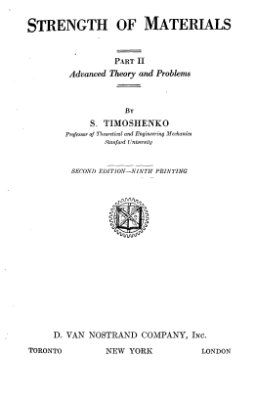OCR-слой! – D. Van Nostrand Company, Inc, Lancaster, PA, 1947,
second edition — ninth printing, 510 pp.
In the preparation of the new edition of this volume, the general character of the book has remained unchanged; the only effort being to make it more complete and up-to-date by including new theoretical and experimental material representing recent developments in the fields of stress analysis and experimental investigation of mechanical properties of structural materials.
The most important additions to the first edition include:
1. A more complete discussion of problems dealing with bending, compression, and torsion of slender and thin-walled structures. This kind of structure finds at present a wide application in airplane constructions, and it was considered desirable to include in the new edition more problems from that field.
2. A chapter on plastic defor mations dealing with bending and torsion of beams and shafts beyond the elastic limit and also with plastic flow of material in thick-walled cylinders subjected to high inteal pressures.
3. A considerable amount of new material of an experimental character pertaining to the behavior of structural materials at high temperatures and to the fatigue of metals under reversal of stresses, especially in those cases where fatigue is combined with high stress concentration.
4. Important additions to be found in the portion of the book dealing with beams on elastic foundations; in the chapters on the theory of curved bars and theory of plates and shells; and in the chapter on stress concentration, in which some recent results of photoelastic tests have been included.
Since the appearance of the first edition of this book, the author's three volumes of a more advanced character, "Theory of Elasticity, " "Theory of Elastic Stability, " and "Theory of Plates and Shells" have been published. Reference to these books are made in various places in this volume, especially in those cases where only final results are given without a complete mathematical derivation.
It is hoped that with the additions mentioned above the book will give an up-to-date presentation of the subject of strength of materials which may be useful both to graduate students interested in engineering mechanics and to design engineers dealing with complicated problems of stress analysis.
In the preparation of the new edition of this volume, the general character of the book has remained unchanged; the only effort being to make it more complete and up-to-date by including new theoretical and experimental material representing recent developments in the fields of stress analysis and experimental investigation of mechanical properties of structural materials.
The most important additions to the first edition include:
1. A more complete discussion of problems dealing with bending, compression, and torsion of slender and thin-walled structures. This kind of structure finds at present a wide application in airplane constructions, and it was considered desirable to include in the new edition more problems from that field.
2. A chapter on plastic defor mations dealing with bending and torsion of beams and shafts beyond the elastic limit and also with plastic flow of material in thick-walled cylinders subjected to high inteal pressures.
3. A considerable amount of new material of an experimental character pertaining to the behavior of structural materials at high temperatures and to the fatigue of metals under reversal of stresses, especially in those cases where fatigue is combined with high stress concentration.
4. Important additions to be found in the portion of the book dealing with beams on elastic foundations; in the chapters on the theory of curved bars and theory of plates and shells; and in the chapter on stress concentration, in which some recent results of photoelastic tests have been included.
Since the appearance of the first edition of this book, the author's three volumes of a more advanced character, "Theory of Elasticity, " "Theory of Elastic Stability, " and "Theory of Plates and Shells" have been published. Reference to these books are made in various places in this volume, especially in those cases where only final results are given without a complete mathematical derivation.
It is hoped that with the additions mentioned above the book will give an up-to-date presentation of the subject of strength of materials which may be useful both to graduate students interested in engineering mechanics and to design engineers dealing with complicated problems of stress analysis.

